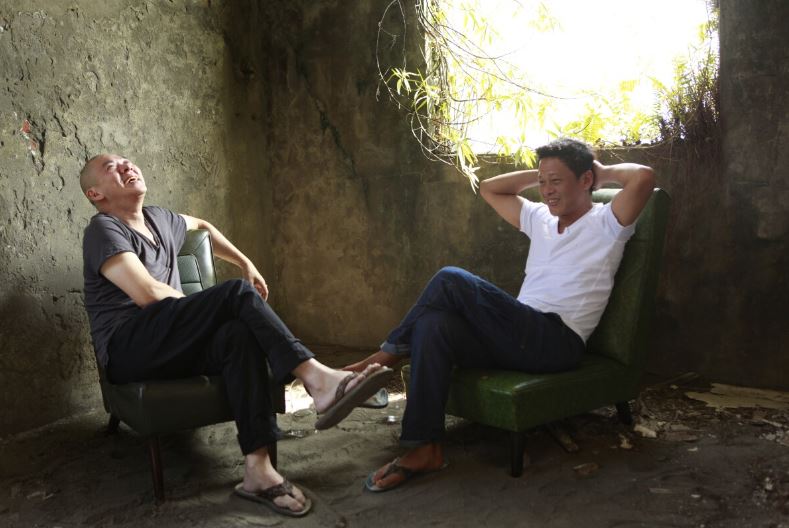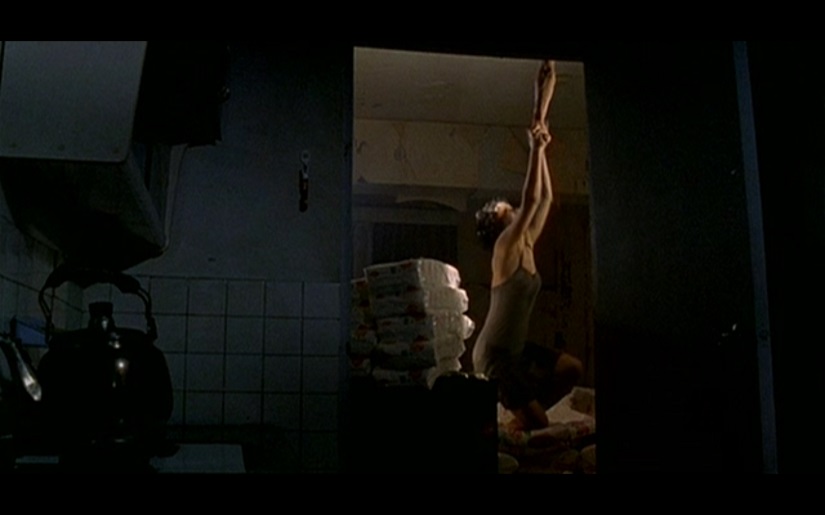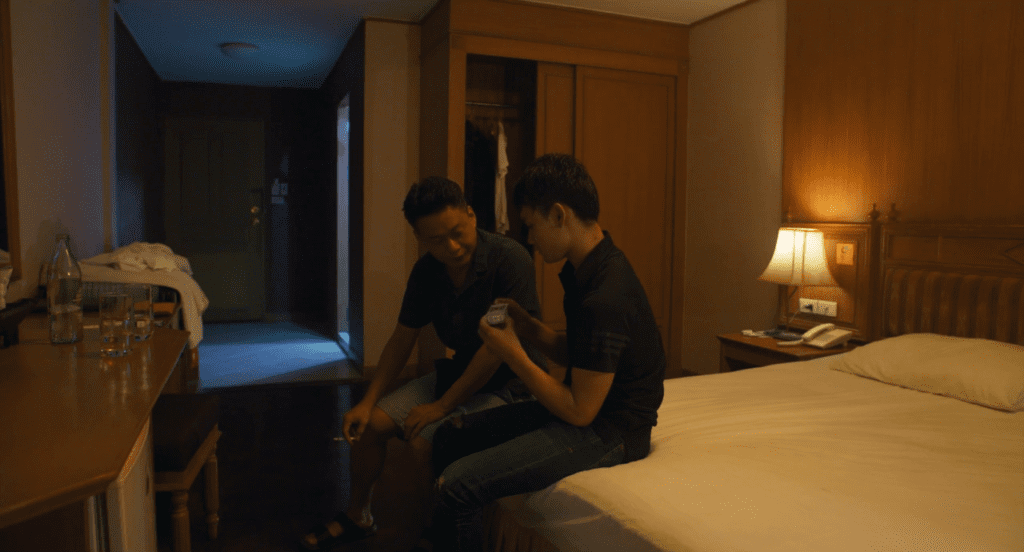
TSAI MING-LIANG (L) AND LEE KANG-SHENG (R) IN AFTERNOON (2015)
The sound pattern of rainfall is aimless. However, in an absent daze, you might delude yourself into thinking that the soft pounding against glass falls into a meaningful rhythm. Distraction — an intruding noise, a flick of quick movement, a presence of another heartbeat entering the room — can make you forget the tempo that you imprinted in your head. But a small creation of a mind trick, even if temporary, can craft a purpose or significance.
If there is a line that is reiterated throughout Taiwanese director Tsai Ming-liang’s prolific filmography, it would be the rain speaking in a run-off sentence, filling the dialogue space when the characters did not. In his usual atmosphere of dreary melancholy, Tsai’s relationship with rain might be a comfort blanket (or it may also be an accurate reflection of Taiwan’s climate; a quick search will say that the island receives an annual average of 102 inches of rain — a little more than double Massachusetts’ yearly average). Rain is present in most, if not all, of his films. The Hole, which was written in 1998 after Tsai was prompted to envision what the turn of the millennium would look like in Taiwan, seals the two main characters indoors from a fictional virus that causes people to retreat in dark corners. Though it’s not clear how the virus is contracted, one would think that the rain, which occurs throughout the film, is the physical manifestation of the virus.
There are a few other threads in Tsai’s works. The most explicit is his longtime collaborator, Lee Kang-sheng, who has starred in all of his movies since Tsai’s first foray into telefilms in 1989. When Rebels of the Neon God was released in 1992, the reticence in Lee’s screen presence was initially a camouflage for the character’s youthful angst. Hsiao-kang — the name so commonly used for Lee’s characters that it is as much of an alter-ego as Batman is to Adam West — holds such a rebellious loneliness that his mother’s belief seems like it nails the rationale: he is the reincarnation of Nezha, the Neon God, whose hatred towards his father has driven him to patricide. After overhearing it, Hsiao-kang acts erratically in front of his parents to spook them and trashes a bully’s motorcycle, as a Gen-X reincarnation of Nezha living in Taipei would. Lee would later transform that loneliness in his career, as teenagers making it to adulthood do. Eventually, that air of mythology settles more into a formative legacy: living against time.

People will find a different experience in watching a Tsai movie. According to a New Yorker profile last year, Tsai’s recent initiative to strip the narrative from his films is meant to allow the audience to “exercise their own faculties of attention.” That tracks. For a lot of movies, I feel as though my attention is parasitic to the scene, pushing and peeling until I find the intent of the scene before moving on. For a Tsai movie, I find a balanced co-existence with the screen. There is little push from either side, but when it moves, I can decide whether I move with it.
In the HFA’s newest retrospective of Tsai’s most recent films (2003-2020), we see his deliberations to “diminish” emotional-driven performances. His short films, Walker and No No Sleep, which are part of his traveling monk series, exemplify that mission. Goodbye, Dragon Inn, his earliest film in the program, is probably Tsai’s most successful crossover hit, despite it being rarely found on streaming services. Yet the HFA is playing a double feature of Goodbye, Dragon Inn — a film about a Taipei cinema closing its doors by playing the 1967 martial arts film Dragon Inn as its send-off — and then the actual film afterwards. If there was a perfect Saturday night to get into Tsai, this would be it (also, from personal experience: I had made the mistake of not pre-ordering a ticket when it screened at the Brattle last year and literally stopped in the doorway of my building on my way out when I saw that tickets had sold out).

YANG KUEI-MEI IN THE HOLE (1998)
Goodbye, Dragon Inn might be the only movie of this program that showcases community among several strangers, and that is probably because the characters are there for the same reason (well, partly true). Your Face, which is one of the two featured documentaries, also connects strangers for Tsai’s art installation motif: “There is a story your face tells of the passage of time.” Thirteen strangers (including Lee), mostly plucked from the streets of Taipei, consider what to share and how (such as oversharing stories, expressive eyebrows, or disapproving bristling). In this way, the documentary implicitly speaks as a reactionary piece to Tsai’s filmmaking.
For the other films, we return to loneliness as the prominent companion. In Stray Dogs, a story that follows a homeless family, Hsiao-kang’s role as father and guardian evokes a strong sense of isolation, even when he sleeps on a shared mattress or eats a boxed meal with his children. If I had to use a movie last year to describe the piercing sound of solitude, it would be Days, which is about both physical pain and immense emptiness. It can’t be helped; Lee Kang-sheng is the poster face of loneliness.
But if there is a thing that can be called a Tsai climax, it is the brief interaction between lonely people. One of the most touching scenes in Tsai’s films is in The Hole when Hsiao-kang extends an arm to his downstairs neighbor, who he had been feuding with throughout the movie. It doesn’t seem like this intersection of serendipity and intimacy should be promised to us in all of his movies, but somehow, it delivers. In Days, Kang and Non (Anong Houngheaungsy) listen to Charlie Chaplin’s “Limelight” on a music box after a transactional erotic massage. Tsai allows this moment to play as long as the song does, and it’s beautiful because this gift, multilayered in sound and experience, is shared inside and outside the story.
With all due respect, it is useless to describe a scene from a Tsai film. You have to see it in context. And while there may not be a character monologue or a conventional finale to be found in the program (though I Don’t Want to Sleep Alone is near to a cinching closure), the HFA has two beautiful opportunities: Tsai, Lee, and Houngheaungsy will be appearing in person for a Q&A (the first two for the October 10th screening of Afternoon and all three for Days on October 14th). It isn’t not normal, but hearing them acknowledge life in motion might be startling, perhaps in the same way where Kang sobbing and crunching on a cabbage head in Stray Dogs can be considered a “grotesque” scene.
There are a few films I haven’t seen. At first, I thought about watching them in chronological order to truly experience the passage of time. But there is a tinge of familiarity in jumping between life stages of the same people. Even when the movies aren’t narratively related to each other, sometimes I can hear the same faint rhythm of something meaningful and unknown.

HFA will be screening the following (start time at 7 pm unless otherwise stated)
Friday, 9/30: STRAY DOGS (2013, 138 min)
Saturday, 10/1: GOODBYE, DRAGON INN (2003) // DRAGON INN (1967, dir. King Hu, 111 min @ 9 pm)
Monday, 10/3: WALKER (2012, 27 min) // NO NO SLEEP (2015, 34 min)
Sunday, 10/9: LIGHT (2019, 18 mins) // YOUR FACE (2018, 76 min)
Monday, 10/10: AFTERNOON (2015, 137 min) at 6 pm // Tsai Ming-liang and Lee Kang-sheng in person
Friday, 10/14: DAYS (2020, 127 min) – Tsai, Lee, and Anong Houngheaungsy in person
Friday, 10/21: I DON’T WANT TO SLEEP ALONE (2006, 115 min.)

